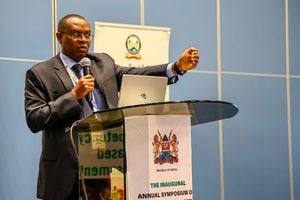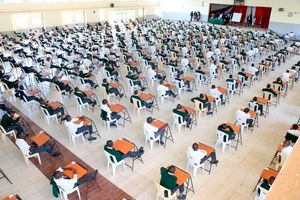
An invigilator inspects the details of KCSE candidates at St Clare Girls Secondary School in Elburgon, Nakuru County during the exercise of putting their identification stickers on lockers on October 30, 2024.
The national examination body has issued fresh rules for the new mid-year Kenya Certificate of Secondary Education (KCSE) examination, which candidates are expected to sit in July.
In this exam, which will be the first of its kind, Kenya National Examinations Council (Knec) has barred three categories of candidates from sitting it.
These categories include learners attending regular school, those sitting the KCSE examination for the first time, and those who do not meet the requisite qualifications as stipulated in the Knec regulations for registration of KCSE examination candidates.
“We cannot allow them to sit for this exam because it is a Kenya Certificate of Secondary Education (KCSE) examination, which is defined by a four-year curriculum. By July, they will not have completed the curriculum,” Knec Chief Executive Officer Dr David Njengere told Sunday Nation.
Dr Njengere said the July series is targeting different categories of candidates, including repeaters (candidates who have sat the KCSE examination in previous years) wishing to improve their grade.
This includes full repeaters (registering for seven or more subjects) or partial repeaters (registering for fewer than seven subjects).
“Candidates who had registered for the KCSE examination but were unable to sit the examination due to unforeseen circumstances such as illness, and adult learners who are not in regular schools but have proof of the requisite primary education qualifications,” said Dr Njengere.
However, all repeaters and private candidates must register for the July series and not the November KCSE examination series.
In a letter to all County Directors of Education, Dr Njengere said the registration period for the 2025 KCSE examination – the July series – will commence on 27th January and end on 21st February 2025.
Those sitting the exams will have to pay Sh7,200 for it.
The registration process will be coordinated and conducted at County headquarters through the offices of County Directors of Education (CDEs) on the Knec registration portal.
“Candidates wishing to register for the July series are therefore expected to present themselves at their respective County headquarters within the stipulated period to complete the registration process,” said the Knec boss.
This comes as a section of officials in the teachers’ unions, parents, and students have raised concerns over the delay in issuing guidelines for the upcoming mid-year KCSE exams.
Many students had already re-enrolled in schools and paid fees in preparation for the exams, only to find themselves uncertain about their next steps.
“What will happen to those students now that they have been left on their own in preparation for the exams? How will they prepare for the exams properly without attending regular classes and lessons?” asked Mr Charles Ng’eno, the Kenya Union of Post-Primary Education Teachers (Kuppet), Narok branch executive secretary.
Bomet Kuppet branch secretary Paul Kimetto said: “This is a matter Knec can immediately review so as not to be seen to have discriminated against the candidates. They could create a parallel line for the repeaters in the November exams.”
Kuppet officials Charles Ng’eno and Paul Kimetto argue that students should have been allowed to sit for the exams in November to ensure adequate preparation, with calls for Knec to review its decision to avoid disadvantaging candidates.
Some principals revealed that students have re-enrolled in lower grades to better prepare, while others worry about how to proceed with learning. Education stakeholders are urging Knec to address the issue promptly, with concerns that proper public participation was not conducted before issuing the exam guidelines.
Mr Stephen Koskei, a member of the Bomet County Education Board, said a proper public participation process ought to have been conducted by Knec before the circular was issued.
Dr Njengere said the existing regulations on registration of KCSE examination candidates would apply as stipulated in the ‘Revised Regulations for KCSE Examination (2024)’ and the User Guide for Management of the Kenya Certificate of Secondary Education (KCSE) Examination (2024), and only eligible candidates shall be allowed to register.
Candidates will be required to present original and copies of the KCPE examination certificate, KCSE examination result slip, or certificate for repeaters.
“The documents are mandatory for successful registration. Statutory identification documents include the National Identity card, Birth Certificate, or Passport, KCPE examination certificate, KCSE examination result slip/certificate for repeaters, and a soft copy of the candidate’s passport photograph,” said Dr Njengere.
Dr Njengere urged Education Officers in charge of registration of private candidates to ensure all eligible candidates download, fill in, and submit the Private Candidate’s Registration Form and all other required documents.
“Upload their correct passport-size photographs (300 x 300 pixels). There will be no replacement/changing of photographs once the registration period is over. Adhere to all registration requirements as stipulated in this circular and related guidelines,” said the Knec boss.
A candidate wishing to repeat (full repeaters or partial repeaters) will be allowed, regardless of the year they sat their KCSE examination.
“As long as there is proof of having registered for the KCSE examination previously. Any candidate wishing to repeat (full repeaters or partial repeaters) will be allowed to do so, regardless of the year they sat their KCSE examination, as long as there is proof of having registered for the KCSE examination previously,” added Dr Njengere.
However, Knec says all candidates must adhere to the laid-down regulations on subject entry requirements for grading (subject clusters) as stipulated in the ‘Revised Regulations for KCSE Examination (2024).
“Ensure that the registration data presented is accurate and error-free, including correct spelling and order of candidates’ names as documented in their KCPE examination certificates and other qualifying documents, gender, year of birth, citizenship, entry codes, birth certificate number, subjects registered for, and category of special needs and disabilities (where applicable). The categories catered for should be indicated as Visual Impairment (blind or low vision candidates), Hearing Impairment (HI - Deaf), and Physical Impairment (PI).”
Knec has also issued a timetable for the July series. Projects for art and design, agriculture, woodwork, metalwork, building construction, and computer studies will be administered between January and July 2025, while theory and practical papers will be administered from 1st July to 1st August 2025.
Additional reporting by Vitalis Kimutai










